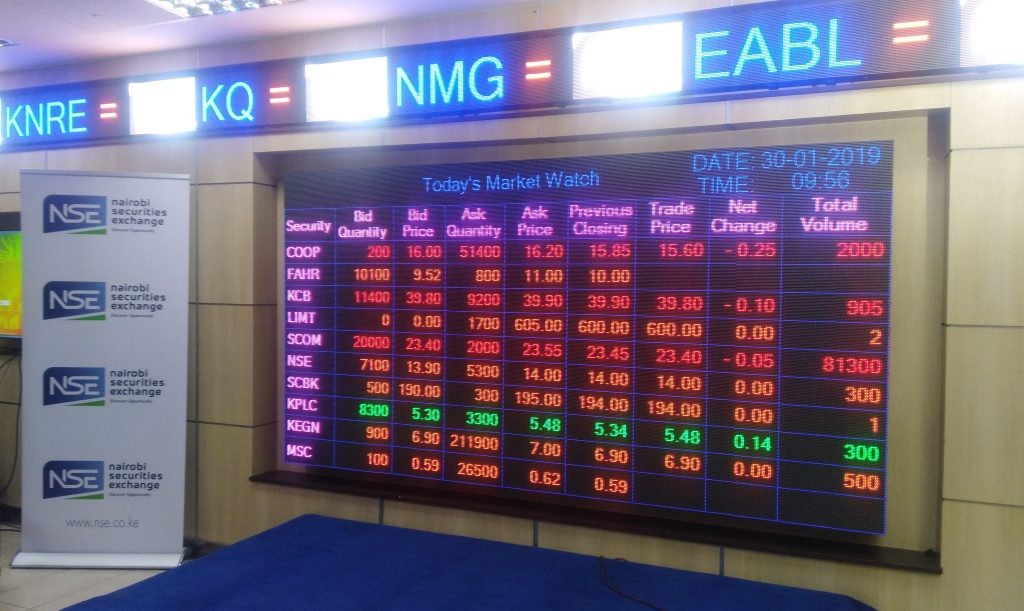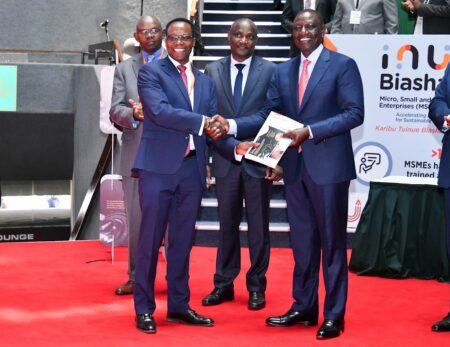The Nairobi Securities Exchange(NSE) has recorded an 82 per sent drop in half year profit to June 30, the self listed firm has reported.
The group’s profit during the period Ksh24 million as compared to Ksh134 million recorded over the same period in 2018.
This was occasioned by an 18 per cent decrease in revenues mainly driven by a 28 per cent drop in equity turnover which declined from Ksh108.5 billion for the six months ended 30 June 2018 to Ksh78.1 billion for the six months ended 30 June 2019.
READ:Bear run continues at NSE with drop in key index
This in turn led to a reduction in equity trading levies by 28 per cent from Ksh259.9 million for the six months ended 30 June 2018 to Ksh187.5 million for the six months ended 30 June 2019.
“The decline in the equity turnover was as a result of low domestic demand which saw an increase in asset allocation towards the fixed income assets,” NSE chief executive Geoffrey Odundo said.
Bonds turnover however edged up 16 per cent to settle at Kshs360 billion as compared to the same period in 2018. During the same period, the NSE reviewed its administrative costs leading to a one-off staff restructuring cost of Ksh52 million. This is not expected to recur in the second half of 2019.
Interest income in the review period decreased by 20 per cent to Ksh47.2 million from Ksh58.9 million recorded over a similar period in 2018 due to utilization of deposits on acquisition of strategic investments.
Share of profit in associate decreased by 66 per cent from Ksh14.7 million for the six months ended
30 June 2018 to Ksh5 million for the same period in 2019 due to the decline in trading performance and increased system costs.
Other comprehensive loss of Ksh10.7 million for the period under review relates to unrealised loss on the fair value of a quoted investment acquired in 2019.
This was passed through Other Reserves. Total assets declined marginally by one per cent from Ksh
2.31 billion as at 30 June 2018 to Ksh2.29 billion as at 30 June 2019.
READ ALSO:Africa Fashionomics: Making sense of the $31 Billion industry
Global economy
Global economic growth remained subdued in the first half of 2019 on account of strained US-
China trade relations coupled with prolonged Brexit uncertainty, that significantly impacted on
investor sentiments, slowing down investment.
In the course of the six month period, the World Bank revised downwards its 2019 economic growth forecast by 0.3 per cent points to 2.6 per cent, from the projected 2.9 per cent as at January 2019.
Kenya
“The macro-economic environment in Kenya during the first half of 2019 continued to face challenges haracterized by erratic weather conditions, low private sector credit growth, reduced liquidity and increased inflation,” Odundo told investors in Nairobi.
During the period under review, the inflation rate increased to an average of 5.2 per cent compared to an average of 4.3 per cent posted over the same period in 2018.
The country however experienced a relatively stable interest rate and currency environment evidenced by a marginal depreciation of 0.5 per cent against the US Dollar and declining yields in government securities in the primary market in the period under review respectively.
Second half outlook
The NSE’s expectation on market performance in the second half of 2019 remains positive, according to management, driven by reduction of interest rates by the Federal Reserve Bank from the previous rate of 2.25 per cent to 2.50 per cent to the current benchmark rate of 2 per cent to 2.25 per cent effected in July 2019; which could spur activity in emerging and frontier markets by foreign investors.
“Stable macro-economic conditions supported by increased infrastructural investments by the Government will offer private sector players growth opportunities through their participation in
the Big Four Agenda,” Odundo said.
The successful launch of the NSE NEXT Derivatives Market at the beginning of July 2019 presents a great opportunity for the NSE to diversify its revenue streams whilst providing investors advanced risk management tools and a new avenue for deployment of capital.
READ:NSE gets green light for Derivatives Market
The market will also increase liquidity of underlying assets as well as buttress our position as a leading financial services hub in Africa.
“The launch is a key milestone in the achievement of our strategic priorities,”the bourse has indicated, “In the second half of the year, we will place special focus on increasing interaction with local and international investors and issuers in a bid to increase activity in the market.”
The NSE will also leverage on the Ibuka Program to create a pipeline of well-structured companies ready to list or access other capital options offered by the bourse.
READ ALSO:How NSE is preparing small companies for listing at the bourse
The programme has grown in leaps and bounds since its launch in 2018, attracting 16 companies since inception, underpinning the programme’s attractiveness among Kenyan companies.
NSE plans to will gear efforts to facilitate issuance of corporate bonds to enable companies access short term capital to support their growth and expansion strategies.
“We will maintain our focus on information services, with NSE providing real time comprehensive market data on a cost basis, to data vendors and other consumers of data who need the same to make informed investment decisions,” Odundo said.
The NSE plans to grow this revenue line by actively engaging with entities and institutions that rely on market data to make business decisions.
With the ongoing upgrade of the Automated Trading System, the bourse anticipates increased trading activity catalyzed by increased systems efficiencies and trading capabilities.
The board of directors does not recommend the payment of an interim dividend for the first half of
the year 2019.
“During the period, the NSE will enhance internal efficiencies at an enterprise wide level and initiate strategic cost reduction initiatives to optimize resources in line with its commitment to maximize shareholder and stakeholder value,” managament has reitarated.
A staff restructuring carried out in the first half is also expected to benefit the company going forward.
The board of directors does not recommend the payment of an interim dividend for the first half of the year 2019.











